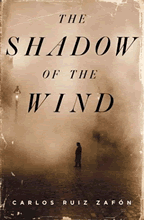'Shadow' illuminates power of words
 Sunday, July 18, 2004
Sunday, July 18, 2004

The Shadow of the Wind
By Carlos Ruiz Zafón
Translated by Lucia Graves
Penguin Press. 487 pp.$24.95
Reviewed by Richard Di Dio
Philadelphia Inquirer - Sunday, July 18, 2004
The book you are about to read will consume you in a way that can only be compared to the discovery and obsession of a first love. In your blindness to the world, you do not see the end coming - the edges of the pages now curling upward, loosing dark soot into the Barcelona sky, as fire destroys the book, its author, and you in the process.
These words, even if expressed, would not have helped Daniel Sempere, protagonist of Carlos Ruiz Zafón's The Shadow of the Wind, avoid the losses and self-discovery that can only be experienced alone.
Daniel, you see, is reading The Shadow of the Wind.
Set in an ashen, post-civil-war Barcelona, novelist and screenwriter Zafón's tale is remarkable in its suspense, structure and magic. A sensation in Europe (where it was the first book to be top seller in both Spanish and Catalán), The Shadow of the Wind is much deeper than book-within-a-book artifice. Zafón brings a unique atmospheric style to the mystery and romance, weaving history and gothic elements in a way that he describes as "the grammar of film and image storytelling."
One morning in 1945, Daniel wakes up terrified: He has forgotten the face of his dead mother. For solace, Daniel's father, a bookseller, takes him to the Cemetery of Forgotten Books. An homage to Borges' Labyrinth and Eco's Library, the cemetery is safe harbor for books that have fallen out of circulation and the consciousness of readers. Daniel's first cemetery visit requires that he choose one of the "books that are lost in time... and adopt it, making sure that it will never disappear, that it will always stay alive."
Daniel adopts The Shadow of the Wind, by Julián Carax, an unknown Spanish author long deceased. Mesmerized by the story, Daniel reads the book in one sitting, knowing that his life has now changed:
Few things leave a deeper mark on a reader than the first book that finds its way into his heart. Those first images, the echo of words we think we have left behind, accompany us throughout our lives and sculpt a palace in our memory to which, sooner or later - no matter how many books we read, how many worlds we discover, or how much we learn or forget - we will return.
Daniel is driven to find more works by Carax, and any information about him. Ominously, others are also searching, with much darker intentions. Daniel soon discovers that someone has been acquiring and systematically burning all of Carax's books, and that his copy of The Shadow of the Wind may be the world's last.
Aided by a loquacious, self-described lothario named Fermín Romero de Torres, Daniel embarks on his quest - a dangerous journey in which he will discover much about love and memory, Carax and himself.
Language and location contribute equally to the success of this novel. The text has been exquisitely translated by Lucia Graves (the daughter of Robert Graves), with a prose tempo that is of the past, yet timeless. Zafón uses a sensual and apocalyptic Barcelona as more of a supporting character than any human figure - its dark streets and furtive secrets open up a world of long-ago riches and darkness.
A gripping story filled with richly imagined characters and searing romance, Zafón's The Shadow of the Wind will remind you of what it was like to read the first novel that brought you into the world of words, and the power it held, and still holds over you. It will certainly never appear in the Cemetery of Forgotten Books.
Richard Di Dio teaches mathematics and physics at La Salle University.



Reader Comments